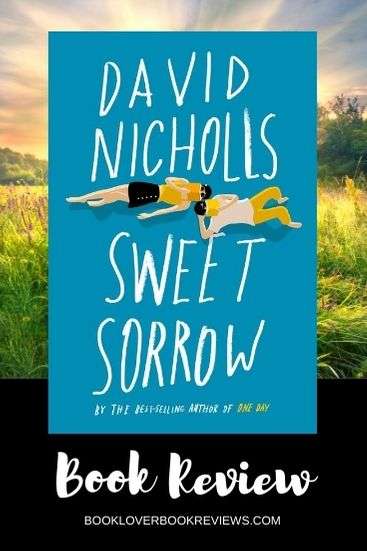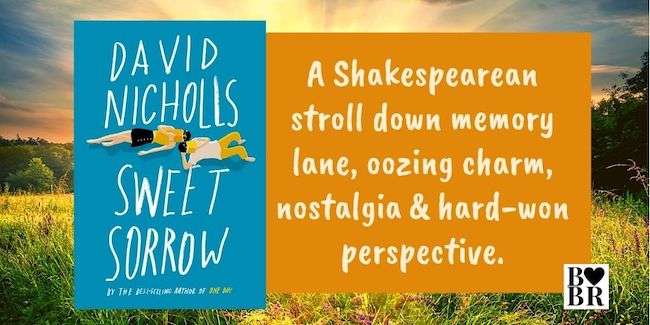Sweet Sorrow by David Nicholls, Review: Nostalgic charm
Sweet Sorrow, David Nicholl’s latest contemporary drama, oozes nostalgic charm and remembers the burning intensity of adolescence. Read on for our full review.
Sweet Sorrow Book Synopsis

From the best-selling author of One Day comes a bittersweet and brilliantly funny coming-of-age tale about the heart-stopping thrill of first love—and how just one summer can forever change a life.
Now: On the verge of marriage and a fresh start, thirty-eight-year-old Charlie Lewis finds that he can’t stop thinking about the past, and the events of one particular summer.
Then: Sixteen-year-old Charlie Lewis is the kind of boy you don’t remember in the school photograph. He’s failing his classes. At home he looks after his depressed father—when surely it should be the other way round—and if he thinks about the future at all, it is with a kind of dread.
But when Fran Fisher bursts into his life and despite himself, Charlie begins to hope.
In order to spend time with Fran, Charlie must take on a challenge that could lose him the respect of his friends and require him to become a different person. He must join the Company. And if the Company sounds like a cult, the truth is even more appalling: The price of hope, it seems, is Shakespeare, Romeo and Juliet learned and performed in a theater troupe over the course of a summer.
Now: Charlie can’t go the altar without coming to terms with his relationship with Fran, his friends, and his former self.
Poignant, funny, enchanting, devastating, Sweet Sorrow is a tragicomedy about the rocky path to adulthood and the confusion of family life, a celebration of the reviving power of friendship and that brief, searing explosion of first love that can only be looked at directly after it has burned out.
(Houghton Mifflin Harcourt, August 2020)
Genre: Literature, Drama, Romance
Disclosure: If you click a link in this post we may earn a small commission to help offset our running costs.
Sign up to our Booklover Book Reviews emails and receive our gift for new subscribers. LEARN MORE >>
BOOK REVIEW
In Sweet Sorrow David Nicholls takes readers on a Shakespearean stroll down memory lane. The narrative, the bulk of it told in knowing reflection, depicts well the restless mood of the late 1990s and that burning intensity and weightiness we attribute to feelings and events during our youth. Things that later in life we might look back on, with hard-won perspective, as merely speed bumps.
I knew from science fiction, rather than from Science lessons, that time behaves differently depending on your location, and from a sixteen-year-old’s lower bunk at the end of June in 1997, it moved more slowly than anywhere else in the cosmos.
Evocative characterisation
Lead Charlie Lewis (the similarity to the iconic cartoon character Charlie Brown likely intentional) is an underdog that readers will barrack for. One disappointment after another, and lacking the ‘perfect’ role model, he’s filled his cup with pessimism, secretly wanting but not daring to hope for anything better.
I must have looked lonely, though I would have hated anyone to think this. Boredom was our natural state but loneliness was taboo and so I strained for the air of a loner, a maverick, unknowable and self-contained, riding with no hands. But a great effort is required not to appear lonely when you are alone, happy when you’re not. It’s like holding out a chair at arm’s length, and when I could no longer maintain the illusion of ease, I’d cycle out of town.
And, to his loutish mates, anyone that dares public displays of enthusiasm about ‘the arts’ must be either elitist snobs or members of a cult:
Ivor and Alina bounded forwards with such force that their chairs skittered back across the parquet. “How are you doing, kids, all right?” shouted Ivor, plump and wide-eyed like a spoilt King Charles Spaniel. Fine, we mumbled, but Ivor had the bumptious, cajoling demeanor we knew from kids’ TV. He cupped his ear. “I can’t hear you!”
Weighty symbolism
But what emotion, other than first love’s pull could cause a moody adolescent to throw aside childhood loyalties (and preconceived ideas) and spend his summer holidays with a theatre group?
Sweet Sorrow is rife with symbolism, harking back to both the characters in Romeo and Juliet specifically (the play the teens are rehearsing for a large portion of this novel) and the Shakespearean tropes more generally. The warring factions, the young and the old, the haves and the have nots, all with greater similarities than either party would care to admit. The dramatic longing and immediacy of youth. The dark humour to be found in perceived tragedy.
Sweet, so would I:
Yet I should kill thee with much cherishing.
Good night, good night! Parting is such sweet sorrow.
In the process of learning to interpret the iconic Shakespearean script, Charlie learns more about himself, those around him and life’s story arc more generally. Nicholls is a master at character development, but in this outing I’d describe his approach as particularly languorous. The decision to tell this story in reflection had already neutralised tension to a large degree, and the recounting of perhaps more non-euphemistic ‘running through lines’ than was necessary, left lulls in story momentum.
Hilariously cutting dialogue
But Nicholls’ trademark mastery in cutting, pop-culture and sarcasm-laden banter (that made One Day one of my all-time favourite novels) also shines strong in Sweet Sorrow. For example, a scene in which Charlie’s fiancée suggests inviting his first love to their wedding, is superb.
I’ve not spoken to her for . . . twenty years!”
“But I want to see her!”
“Aren’t you scared that I might just walk off during the vows?”
“That’s exactly why I want her there. Get a bit of a Four Weddings vibe going on, bit of tension, bit of an edge.”
David Nicholls’ Sweet Sorrow is a touching and nostalgic trip down memory lane for those of us that grew up in the 90s. And, for readers too young to remember that decade, hopefully, it will serve as a compelling dose of perspective.
BOOK RATING: The Story 3.5 / 5 ; The Writing 4 / 5 — Overall 3.75
Get your copy of Sweet Sorrow
Reading Update: We have since loved David Nicholls’ You Are Here (2024).

More Sweet Sorrow Reviews
“Nicholls excels at capturing Charlie’s insecurity, the messy exuberance of first love, and the coarseness of teenage male friendships . . . A good deal of fun.”—Publishers Weekly
“With fully fleshed-out characters, terrific dialogue, bountiful humor, and genuinely affecting scenes, this is really the full package of a rewarding, romantic read.”—Booklist, starred review
“Sweet Sorrow . . . an ideal blend of the gently humorous and utterly heartfelt. It made me feel like something had swollen up inside my chest, and readers are liable to find their thoughts drifting over their own misspent school holidays or crushingly ardent first loves.” —Independent
If you like the sound of Sweet Sorrow, you may also enjoy reading:
Bridge of Clay by Markus Zusak / The Origin of Me by Bernard Gallate / The Trouble With Goats & Sheep by Joanna Cannon / The Book Thief by Markus Zusak / Skippy Dies by Paul Murray
About the Author, David Nicholls
David Nicholls is the best-selling author of Us, One Day, The Understudy and Starter for Ten. His novels have sold over eight million copies worldwide and are published in forty languages. Nicholls trained as an actor before making the switch to writing, and he recently won a BAFTA for Patrick Melrose, his adaptation of the novels by Edward St Aubyn, which also won him an Emmy nomination. He lives in London.
* My receiving a copy from the publisher for review purposes did not impact the expression of my honest opinions.
